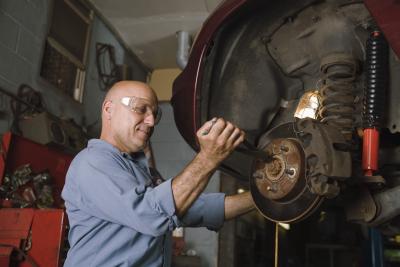
In a vehicle, heat energy from the engine is converted into kinetic energy to enable its motion. When it comes to stopping motion, the same needs to be done in reverse--the kinetic energy needs to be converted into heat energy, bringing the vehicle to a stop. This is achieved using frictional devices called brakes. Most light vehicles today use hydraulic fluid brakes while in most heavy vehicles, brakes operating on compressed air are used.
A hydraulic brake contains special braking fluid in cylinders which is compressed when the brake pedal is pressed, delivering the pressure to the frictional components near the wheels which then press against each other to stop the vehicle. This process has a serious drawback: if there is a leak in the braking system which results in partial or complete loss of the braking fluid, the efficiency of the braking system is significantly reduced or even completely lost. Air brakes remedy this issue by using air instead of any special braking fluid to deliver pressure to the braking components. Since air is readily available for free everywhere on the surface of earth, this significantly reduces the chance of brake failure due to leaks in the braking system. This is the primary reason for the use of air brakes being mandatory under governmental regulations for vehicles exceeding a certain size or carrying passengers for commercial purposes.
Air brakes are much more reliable than hydraulic brakes. Firstly, most modern air brakes operate on a principle known as the triple valve system, as explained on SDRM.org's Train Air Brake Description and History article, which is designed in a manner opposite to hydraulic brakes or even previously used types of air brakes. In a conventional braking system, the brake is in its released position by default and is activated only when the braking fluid is compressed. Triple-valve system air brakes however, are in the activated state by default and are released only with compressed air pressure. When the vehicle is started, the compression begins and the brakes are released when the vehicle is put to motion. Thus, if there is a leak or even if the compression mechanism completely fails, the brakes revert back to their default, activated position and the vehicle is brought to rest.
The special braking fluid used in hydraulic brakes is quite expensive. Air on the other hand, is freely available. Although this doesn't make much of a difference in small vehicles which require little hydraulic braking fluid, it does matter significantly in larger vehicles like heavy duty trucks and locomotives which would require high quantities of the fluid if hydraulic brakes were used.